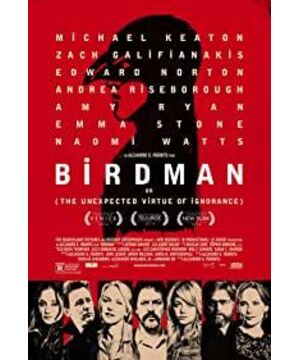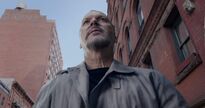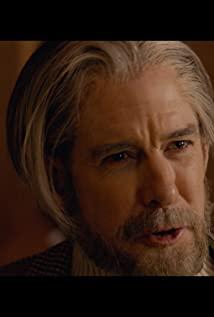Basically, the film "Birdman" satirizes every aspect of the film industry, and it is also sharp, cursing all moviegoers, the general public, and today's developed social networks. In "Birdman", the actor Regan said when he scolded film critics: "How far does a person have to be to become a critic? You only label things. Without labels, you don't know this at all. world". Obviously, only those who understand the psychology of critics can write such appropriate lines. All people who write film reviews convert a movie into a number of tags to review, and in the end they only remember these tags. , As for the movie, it will soon be forgotten, the only thing left is the label, only the label. It is precisely because "Birdman" conveys such a point of view that any attempt to evaluate or label this film seems extremely stupid and childish.
The male protagonist Regan worked hard and money to create a work that he thought was a masterpiece, but in the end he found that the audience didn't care about his work at all, and the critics did the same. Every time his work appeared in the media headlines for the same reason Not because of the work itself, but because of the lace news (for example, the video of the actor Regan walking in Times Square wearing only underwear has reached more than 10,000 hits on social networking sites in just a few minutes, and the public has begun to question whether he is in the Make publicity and hype for your own stage play), no one pays attention to what the content of this stage play is. And what finally brought the media and critics back to him (rather than his work) was the fact that the actor shot himself in the nose with a real gun on stage, and the public was reminded of the outdated superhero actor again. , everyone spontaneously prayed for him. Stories like this are the director's public satire of the film industry and the IQ of the masses. For movies, the public doesn't care about how much energy the creators put in and the quality of the movies. What they like is only cool special effects pictures and entertainment lace news outside of movies. Today's movies, especially Hollywood movies, are more Like a giant entertainment industry, not a "seventh art". In the movie, the stage play directed by the male protagonist is called "When We Talk About Love, What Are We Talking About?" It is probably appropriate to replace the word "love" with any word. The name tells us: "When we talk about movies, what are we talking about? Maybe it's only the movies themselves that we don't talk about!".
"Birdman" is an all-around satire of Hollywood movies, including Hollywood's star system. At the beginning of the film, the male protagonist we saw was suspended in the air, and the off-screen narration appeared from time to time and anytime, anywhere, or encouraged, touted or attacked the male protagonist Regan. We even mistakenly thought that the male protagonist really had superpowers. . But later we found out that all this was just the hero's imagination, which originated from the conceit of the hero and his addiction to illusory fame after he became famous in his early years. The fame of starring in "Birdman" brings the male protagonist an illusion that he can dominate the world, as if he really has super powers and can dominate everything just like the "Birdman" role he plays. And the voice-over that appears from time to time is the real inner monologue of the male protagonist in different situations and stages. On the surface, this monologue comes from the "Birdman" character back then, but it actually represents the male protagonist's inner illusion of dreams, addiction to fame and fortune, and ideals Contradiction with reality and inner confusion. In the early years, he starred in "Birdman" and became famous, leaving the male protagonist with the label of a screen superhero (an actor's icon). To get rid of the superhero image in the public mind and to find the real art in his heart, this conceited illusion makes him feel as if he really has superpowers. But as the story progresses, the male protagonist Regan gradually realizes the fact that he is actually just a past movie star begging others to pay attention. The male protagonist's daughter's addiction to drugs is a metaphor for the male protagonist's addiction to fame. It is also the daughter's words that make the male protagonist Regan gradually realize that no one really pays attention to his works. The male protagonist satirizes his daughter living in the online world and intoxicated Due to the illusory pageviews, the daughter criticized her father for being nostalgic for his past vanity, narcissism, and under the banner of breaking through her, but she was actually begging the public to pay more attention to herself, chasing false names and ignoring her family, and the male protagonist began to reflect on his own at this time. behavior, and reflect on what you are looking for. In essence, the father and the daughter are the same person. The daughter is addicted to the Internet and drugs, and the father is addicted to illusory fame. They are all addicted to nothingness. In the end, after the male protagonist Regan blew his nose on the stage, he successfully regained the attention of the public, including the critics, but this result was not what the male protagonist wanted, he wanted to pursue real art , instead of these vain coats. When the male protagonist looked in the mirror in the bathroom, the image of the bird man appeared again in the mirror. He finally understood that he still failed to take off the label of the "bird man" in the audience's mind, and he worked hard Go with money to find the art in your heart, but in the end the audience, including the critics, don't care about your work at all How, they are only concerned about blowing their noses. They have worked hard for a long time, but they still can't get rid of the rules of the operation of the entertainment industry. They feel that they can control everything. In fact, they are just a pawn dominated by the industry. Hollywood gives them It's just a daydream that seems to be about dreams, but is actually about fame and fortune. In the second half of the film, the male protagonist Regan finally realizes that the fame and fortune he once indulged in are illusory things, and he should return to love and family. At the end of the film, the male protagonist stares at the free bird outside the window and jumps off the tall building, exchanging death for the liberation of secular rules and fame and fortune, and in exchange for true freedom. At the end, the daughter looked at the sky by the window and smiled. She understood that her father had an epiphany and was relieved. But at this time, the tone of the film has changed from the bright warm colors in the first half of the hospital scene to the melancholy cool colors, blue. This tone change symbolizes the change of the male protagonist's mood. He finally realizes that what he is chasing is only illusory fame and fortune. He didn't change anything, but he lost his love, family and life, and finally committed suicide.
After the subtitle of the film, the director wrote a meaningful sentence: "The production and licensing of this film have created at least 12,000 jobs and took hundreds of thousands of hours." Obviously, this sentence is the director's own words. Self-deprecating, "Birdman" satirized the entire Hollywood film industry and the public again and again, but he still failed to jump out of this circle and go beyond the rules of reality. The production of "Birdman" still has to follow the standard process of industrialization. The public is concerned about Nor can it be the movie itself, but the jobs and entertainment lace.
Every character in the film "Birdman" is full of a deep sense of crisis, doubt and confusion, similar to a mid-life crisis. This kind of doubt manifests itself in different ways for everyone, but the essence is the same . For example, the male No. 2 Mike is playful on the surface, but his heart is full of unease and doubt. In fact, Mike's playfulness comes from seeing the world and knowing the rules. He knows what the audience wants. He is the representative of reality and rules, while the male protagonist Regan is the representative of dreams. The two are in the film. They are opposites (so the two of them fought, and the contradiction between the two is also one of the important driving forces for the progress of the plot), at least the first half of the story, but in fact everyone is confused. The characters in this film seem to be chasing their lifelong dreams, but in fact, everyone has no idea what they are chasing, as if they are just chess pieces being pushed forward (pushed by the entertainment industry) , they think they are chasing dreams, but in fact they are chasing nothing but fame and fortune. This kind of feeling is like experiencing a mid-life crisis, and then completely denying their own life. Therefore, every time the characters in the play take a step towards the final success, their spirits are also one step closer to collapse. In the end, everyone finds that what they are chasing is just a dream of nothingness.
"Birdman" seems to satirize a group of people, and even cursed Hollywood, but from the spiritual core of its essence, it still falls into Hollywood's eternal mainstream values of "love and freedom". Although this film has the shell of a mid-life crisis story, it also has some anti-mid-life crisis movies in its form. It ruthlessly satirizes dreams. We always feel that we are chasing dreams. In fact, what we pursue is nothing but worldly fame and fortune. Everything is just a dream of Nanke, a complete daydream. On the surface, the film is anti-traditional and satirical, but from the perspective of the core of values, the film still conveys the mainstream values of the United States, "love and freedom", which is the essence of the film's ability to sweep the Oscars.
In the end, let's go back to the film technique. The biggest technical feature of the film "Birdman" is the unedited, one-shot long-shot (in fact, there are edits, and the director covers up the editing points with shady screens or special effects. This kind of unedited, one-shot storytelling technique, as early as Hitchcock's time, he tried it, but at that time, the public acceptance of this technique was very low.). If we discuss the use of directing techniques in this film, the first question we face is why did the director use this one-shot, long-shot technique to tell the story? I think the director should use this technique based on the consideration of the unity of the technique form and the plot content. We all know that for the audience, the camera is equivalent to the eyes. The long-lens technique is very realistic and seems to bring us into the situation where the protagonist is. It creates an illusion of watching a stage play, as if we are just quietly Watching the actors perform. In this film, what the protagonist paid a lot of effort to prepare is precisely a stage play. The technical processing of long-lens photography makes the audience often have an illusion of "Am I watching a movie or a stage play in a movie". On the one hand, the illusion forms a subtly corresponding relationship with the stage play performed by the actors in this film; The characters' inner confusion, confusion and contradictions, they all feel that they are trying hard to pursue their dreams, but they don't know what they are pursuing, and finally realize that what they are pursuing is only illusory fame and fortune, which is meaningless. The use of the one-shot long-shot technique skillfully achieves the unity of the technique form and the film content. Of course, this technique has high requirements for scene scheduling and performance. "Birdman" not only completed such a challenge well , and created a lot of great composition. In addition, the director also used the iconic drums to move the story forward. There is basically no background music in this film, but drums are used on key plot points to create an atmosphere. As long as there are key points in the conflict of the story, or when the characters in the play are conflicted and confused, this iconic drum will appear, assisting Advance the development of story contradictions.
One shot to the end, without editing, means that all transitions have to be done through mise-en-scene. In "Birdman", the director uses scene scheduling to make transitions, which creates a feeling of jumping in many places. Coupled with the frequent switching of viewpoints, it will give the audience a sense of time and space confusion, but this sense of confusion is different from The suspicious, confused, contradictory, and chaotic moods of the characters in the play fit together just right, and this kind of scene scheduling makes people feel very amazing. The film uses more red and blue, or dim yellow tones, and the transition of tones is also very interesting. Since there is no editing, the director can only use pure lens language to express opinions and convey information. In fact, we also see that "Birdman" does have a lot of good composition, lighting, color and other picture elements. Since this film is shot with a one-shot, long-lens shot, there is no editing point, so a lot of subtle picture information is expressed in the lens movement, which requires the audience's keen insight to capture this information, and then to understand the director's The intention is to really step into the film world constructed by the director.
View more about Birdman or (The Unexpected Virtue of Ignorance) reviews











